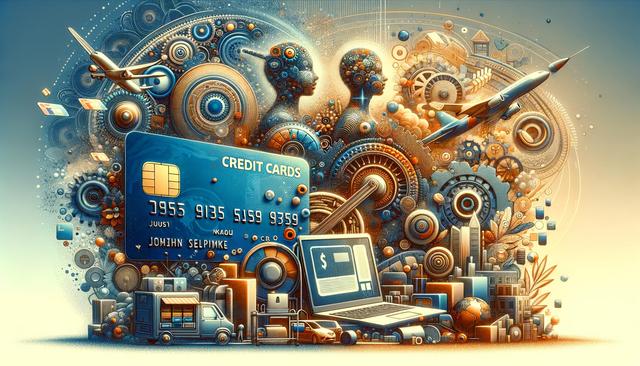What Are Credit Cards and How Do They Work?
Credit cards are financial tools issued by banks or financial institutions that allow users to borrow funds within a specified credit limit. These cards are widely accepted for purchases online and in-store, and they can also be used for withdrawing cash, although cash advances often come with higher fees and interest rates. When individuals apply for credit card accounts, they are evaluated based on their credit history, income, and other financial indicators. Once approved, the user receives a credit limit, which is the maximum amount they can borrow at any time.
Using a credit card wisely means paying off the balance in full each month to avoid interest charges. Otherwise, unpaid balances are carried over and accrue interest, which can lead to increased debt. Many people opt for cards that offer instant credit card processing, allowing them to begin using their cards immediately after approval. This feature is especially useful for online shopping or emergency expenses where quick access to funds is critical.
How to Apply for a Credit Card
Applying for a credit card is a straightforward process, but choosing the right one requires some research. Different cards offer various features, such as rewards, cash back, or lower interest rates. To start, individuals should:
- Review their credit report and score to determine eligibility
- Compare card offers based on fees, interest rates, and benefits
- Gather necessary documentation such as proof of income and identification
Once ready, applicants can apply for credit card accounts either online or at physical bank branches. Online applications often provide faster responses and sometimes include incentives like waived first-year fees. Some providers advertise guaranteed credit card approval $5000, but these offers should be examined carefully. While they may sound appealing, the terms and eligibility requirements vary and may include higher fees or limited usage until creditworthiness is established.
Benefits and Risks of Credit Card Use
Credit cards offer numerous benefits when used responsibly. They provide a convenient payment method, help build a credit history, and often come with added features like travel insurance or fraud protection. Additionally, many cards offer rewards programs that let users earn points or cash back on purchases.
However, there are also risks involved, particularly for those who carry a balance month-to-month. Some common pitfalls include:
- High-interest rates on unpaid balances
- Late payment fees and penalties
- Potential negative impact on credit score due to missed payments
To mitigate these risks, it’s crucial to set spending limits, track expenses, and prioritize paying the full balance each month. Choosing cards with features like instant credit card processing can also help users manage their accounts more efficiently.
Credit Card Processing: What Consumers Should Know
While credit card users often focus on rewards and fees, understanding how credit card processing works can also be valuable. Credit card processing is the system that allows transactions to be authorized, approved, and completed between the user, the merchant, and the card issuer. This entire process happens in seconds and is often referred to as instant credit card processing.
For merchants, finding the cheapest credit card processing services can lead to significant savings, especially for small businesses. Lower processing fees mean better profit margins and potentially lower costs for consumers. Individuals using credit cards benefit from this system through quick, secure, and reliable transactions, both online and in person.
As a consumer, it’s helpful to understand that every time you swipe or tap your card, there’s a backend network of banks and processors working to make that transaction happen. This system ensures funds are transferred correctly and securely, all while protecting sensitive financial information.
Choosing the Right Credit Card for Your Needs
There’s no one-size-fits-all solution when it comes to credit cards. Selecting the right card depends on your spending habits, financial goals, and credit profile. Individuals who travel frequently might look for cards with travel perks, while those focused on savings may prefer cards with low fees or strong cash-back programs.
When searching for a suitable card, consider factors such as:
- Annual fees and interest rates
- Rewards or cash-back options
- Introductory offers and terms
- Eligibility and approval requirements
Some providers promote guaranteed credit card approval $5000, which can be attractive for those with limited or poor credit history. However, it’s important to review the fine print and ensure the offer aligns with your financial needs. Also, using cards that support instant credit card processing can help streamline your financial transactions without delays.
Ultimately, comparing offers and understanding your own financial behavior are key to making an informed decision. Also, for those running small businesses or side gigs, exploring the cheapest credit card processing options can make a difference in managing overhead costs effectively.
Conclusion: Making Credit Cards Work for You
Credit cards can be a powerful financial tool when used responsibly. Whether you’re looking to build credit, earn rewards, or gain access to emergency funds, understanding how credit cards function is essential. From how to apply for credit card offers to identifying the cheapest credit card processing solutions, informed decisions can lead to better financial outcomes. Remember to assess your needs, monitor your spending, and evaluate all options carefully—including those with features like guaranteed credit card approval $5000 or instant credit card processing. By doing so, you can make credit cards work for you—not against you.




Leave a Reply